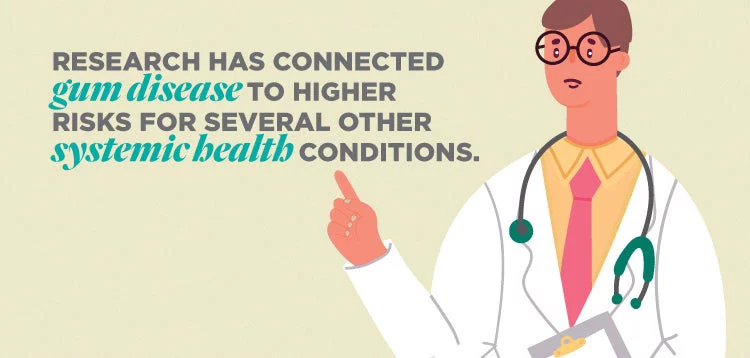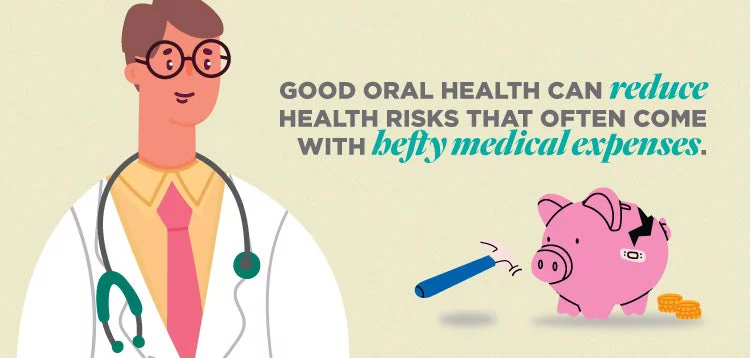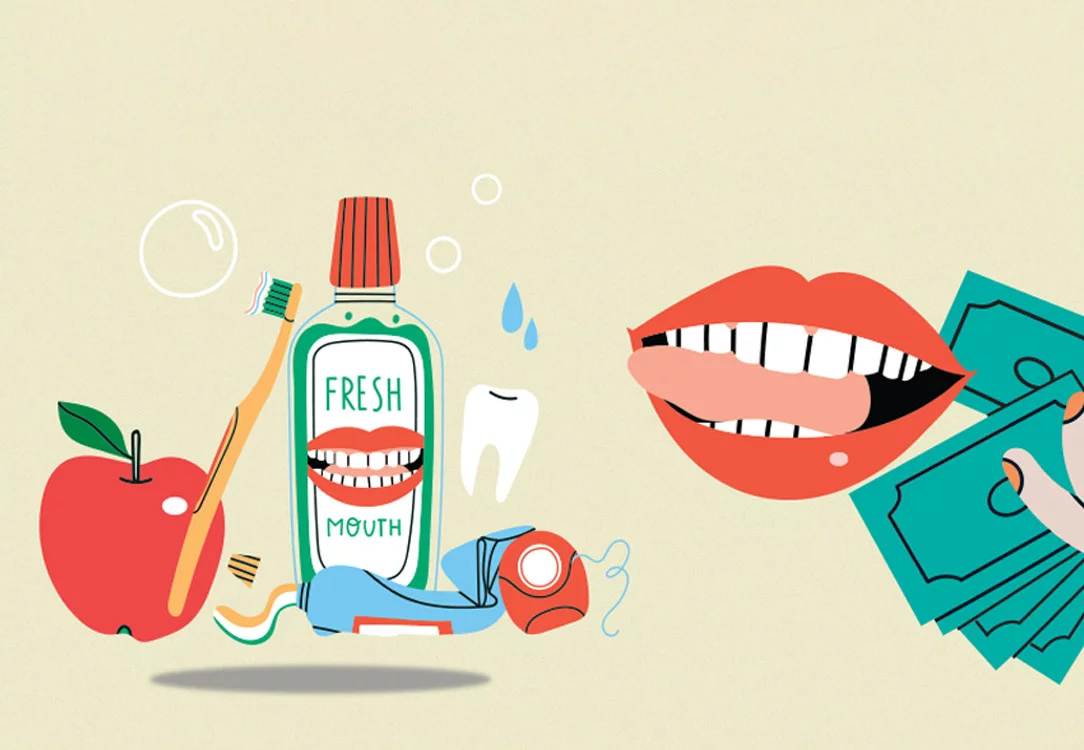Scientific evidence shows that taking care of your oral health can improve your overall health. We call this the Mouth-Body Connection®. But did you know that healthy teeth and financial savings are also connected? Yep. Brushing and flossing can help your finances as well as your smile.
How Does Taking Care of Oral Health Save Me Money Long Term?
It all has to do with prevention. Consistent oral care at home keeps a lot of common oral diseases, like gum disease and cavities, from developing. There are fewer expenses at the dentist’s office when there is no disease to treat.
Some hidden costs associated with poor oral health teeth start early in life. For example, tooth decay can lead to slowing development in children, and poor educational performance and behavior. [1] Oral health problems also keep children from going to school. Per research in 2015, 30 percent of US kids from age six to twelve miss over nine million school days because of oral health problems.[2]
Poor oral health can lead to problems in adulthood, too. It can hold people back in their careers. The American Dental Association’s reported in 2015 that 29 percent of low-income adults and 28 percent of young adults report how they feel about their teeth’s appearance affects their performance at a job interview. [3] Missing out on opportunities because of a poor interview could lead to considerable salary loss over a person’s lifetime.
How Does Oral Health Affect My Overall Health Care Expenses?
The most significant effect your oral health has on health care expenses is that diseases like gum disease influence the health of your body’s systems. The connection is between bacteria and inflammation.
Gum disease happens when bacteria infects the tissues surrounding your teeth and bone. It can cause red, swollen gums that bleed when you brush or floss. As the condition worsens, it can lead to loss of gum tissue, called gum recession, bone loss, and tooth loss. [4]
However, the bacteria that starts in the gums doesn’t necessarily stay there. As it gets into the bloodstream and travels throughout the body, it can add to its inflammatory load, making it harder for the body to fight off infections elsewhere.
Research has connected gum disease to higher risks for several other systemic health conditions, from heart disease to high blood pressure to diabetes to Alzheimer’s to rheumatoid arthritis (RA) and others. For the patient already with these conditions, gum disease can increase the inflammatory load to the body, making it more difficult for your systems to respond to the systemic needs.
In other words, worsening gum disease isn’t doing your overall health any favors. Nor is it helping bring down your medical bills. Consider the following:
- Patients with heart disease pay around $2,000 a year for out-of-pocket expenses, even when they have insurance. [5]
- Patients that have diabetes incur around $16,750 per year in medical expenditures, with $9,600 ascribed to diabetes.[6]
- Patients with RA pay direct medical costs of around $12,509, and, if they were on biologic medication, $36,053.[7]
- Patients with Alzheimer’s disease had average out of pocket costs in 2015 of $61,522, for services like hiring caregivers for everyday activities. [8]
In addition to an association with these systemic conditions, research shows a link between gum disease and adverse pregnancy outcomes. The CDC estimates that as many as 75 percent of pregnant women have some form of gum disease.[9] Pregnant women with untreated gum disease have higher risks for pre-term births and low birth weights. [10]
If your baby comes early and you have to spend some time in the Neonatal intensive care unit (NICU), the medical bills can mount, too. BabyCenter says that families spent an average of $5,000 on NICU stays in 2021, primarily because of the parents’ insurance companies’ deductible amounts.[11] In addition, premature or low birth weights babies average around $49,000 in their first year for medical care, per the March of Dimes. [12]
While there is no evidence that gum disease causes adverse pregnancy outcomes, there is a correlation. Therefore, medical and dental professionals recommend that pregnant women get treatment for their gum disease. It is not harmful to the pregnancy and will reduce inflammation levels in her body and improve her oral health.[13]
What You Can Do for Your Oral Health and Future Financial Health
Prevention is key with oral diseases like cavities and gum disease. By brushing your teeth for two minutes twice a day, flossing every day, and visiting the dentist at least twice a year, you can prevent many of these oral conditions from developing and worsening.
Changes to your diet and lifestyle can help, too. For example, eating a healthy diet with fewer sugars and starches has nutritional benefits and can enhance your oral and overall health. Also, regular exercise is suitable for all the systems in your body.
Quitting bad habits is another way to improve your oral health and improve your future financial health. For example, quitting smoking and limiting alcohol intake are two great ways to improve your lifestyle and oral health. (Plus, you will also save a lot of money in today’s dollars by not buying cigarettes or alcohol.)
What Else Can I Do to Save on Future Medical Bills?
You can do other things to save on future medical bills. In addition to regular dental care, you should also get regular health screenings with your medical team. If you have gum disease, schedule a screening with your medical team for associated systemic conditions and vice versa. Be sure to discuss your gum disease diagnosis with your doctor, too. Likewise, be sure that you discuss any diagnosis you get from your doctor with your dentist.
Taking care of your oral health can reduce your risks for some systemic conditions that often come with hefty medical expenses that run into the thousands. Also, it can save you money at the dental office, which can also have bills that go well into the thousands. Therefore, we believe healthy teeth and financial savings are the connection between your mouth and your wallet.
We can help you find your trusted dental team to help you maintain your oral health and your finances. As passionate advocates for the Mouth-Body Connection, Smile Generation-trusted dental professionals assess your oral health, take your health history, and discuss any risks you have for your oral health and associated health conditions.
For more information or to find a Smile Generation-trusted dentist near you, use our Find a Dentist Tool.
Find your trusted, local dentist today!
[1] Paul S. Casamassimo, Sarat Thikkurissy, Burton L. Edelstein, Elyse Maiorini, Beyond the dmft: The Human and Economic Cost of Early Childhood Caries, The Journal of the American Dental Association, (2009) Abstract available at: https://doi.org/10.14219/jada.archive.2009.0250.
[2] Survey Finds 30% of U.S. Kids Ages 6 to 12 Miss More Than 9 Million School Days Due to Oral Health Problems (2022). Available at: https://www.deltadental.com/us/en/about-us/press-center/2016/newsreleasekidsmissmoreschooldays201608.html (Accessed: 8 December 2022).
[3] (2022) Ada.org. Available at: https://www.ada.org/-/media/project/ada-organization/ada/ada-org/files/resources/research/hpi/us-oral-health-well-being.pdf (Accessed: 9 December 2022).
[4] Gum Disease Information - American Academy of Periodontology. Perio.org. https://www.perio.org/for-patients/gum-disease-information/. Accessed December 9, 2022.
[5] Rubio, Alejandro. GoodRx (2022). Available at: https://www.goodrx.com/health-topic/heart/manage-costs-of-heart-disease (Accessed: 9 December 2022).
[6] The Cost of Diabetes | ADA (2022). Available at: https://diabetes.org/about-us/statistics/cost-diabetes (Accessed: 9 December 2022).
[7] Andersen, C. and Andersen, C. (2020) How Much Does Arthritis Cost? 6 Patients Get Candid About How Arthritis Affects Their Finances, CreakyJoints. Available at: https://creakyjoints.org/advocacy/how-much-does-arthritis-cost-patient-stories/ (Accessed: 9 December 2022).
[8] Stringfellow, A. (2022) Dementia Care Costs by State: An Overview of Costs, Types of Dementia Care, and the Cost of Dementia Care by State, Seniorlink.com. Available at: https://www.seniorlink.com/blog/dementia-care-costs-by-state-an-overview-of-costs-types-of-dementia-care-and-the-cost-of-dementia-care-by-state (Accessed: 9 December 2022).
[9] Pregnancy and Oral Health – Centers for Disease Control. Cdc.gov. https://www.cdc.gov/oralhealth/publications/features/pregnancy-and-oral-health.html. Accessed December 9, 2022.
[10] Turton M, Africa CWJ. Further evidence for periodontal disease as a risk indicator for adverse pregnancy outcomes. https://doi.org/10.1111/idj.12274 Int Dent J. 2017;67(3):148-156. doi:10.1111/idj.12274
[11] Does insurance cover NICU costs? (2022). Available at: https://www.babycenter.com/baby/premature-babies/7-sources-of-financial-help-for-you-and-your-preemie_10371026 (Accessed: 9 December 2022).
[12] Study: Average preemie costs $49,000 in first year - CNN.com (2022). Available at: http://www.cnn.com/2009/HEALTH/03/17/premature.babies/ (Accessed: 9 December 2022).
[13] Committee Opinion: Oral Health Care During Pregnancy and Through The Lifespan. Acog.org. https://www.acog.org/-/media/project/acog/acogorg/clinical/files/committee-opinion/articles/2013/08/oral-health-care-during-pregnancy-and-through-the-lifespan.pdf. Published 2013. Accessed December 9, 2022.
Smile Generation blog articles are reviewed by a licensed dental professional before publishing. However, we present this information for educational purposes only with the intent to promote readers’ understanding of oral health and oral healthcare treatment options and technology. We do not intend for our blog content to substitute for professional dental care and clinical advice, diagnosis, or treatment planning provided by a licensed dental professional. Smile Generation always recommends seeking the advice of a dentist, physician, or other licensed healthcare professional for a dental or medical condition or treatment.










